Could Republican Gov. John Kasich run for president? According to the Washington Post, he’s poised to, and he certainly seems to be among the better options out there, with the other obvious choices either clearly deranged (Ted Cruz) or totally uninterested (Mitt Romney). But conservatives have not been roundly pleased with Kasich, in part because he is evidently something of a committed Christian.
Last year, Kasich fought doggedly to expand Medicaid coverage in Ohio, extending healthcare to some 275,000 poor people. When queried as to why a conservative would push for expanded coverage, Kasich explained his reasoning thus:
“I had a conversation with one of the members of the legislature the other day. I said, ‘I respect the fact that you believe in small government. I do, too. I also know that you’re a person of faith. Now, when you die and get to the meeting with St. Peter, he’s probably not going to ask you much about what you did about keeping government small. But he is going to ask you what you did for the poor. You better have a good answer.’ ”
Conservative critics did not have a good answer. If Kasich’s challenge required a faith-based, well-reasoned critique of Medicaid to defend Republican animus, that wasn’t what it received. Instead, Kasich’s right-wing opponents produced a series of attacks that seemed straight out of the Richard Dawkins school of rhetoric. At RedState, for instance, Jason Hart complained that “Kasich leaned heavily on his Christian faith to push the Patient Protection and Affordable Care Act,” and glossed over Kasich’s explanation of his Christian reasoning as: “anyone who opposes Medicaid expansion will have to answer for their opposition when they die.”
Of course, Kasich didn’t suggest that anyone who opposes Medicaid expansion will have to answer for such at the pearly gates; he merely pointed out that, at this point in time, Medicaid expansion is the only option for extending healthcare coverage to poor people in Ohio, making it the most sensible Christian option. Were there other options – that is, if Republicans had some small-government program that resulted in equal or better coverage – Kasich’s argument would fall out in favor of that. But as it stands no such substitute exists. It’s notable that misrepresenting Kasich’s Christian defense of Medicaid expansion remains a popular smear. Consider the National Review’s Avik Roy:
[embedtweet id=524584726175416320]
Roy’s lie is as glib as it is lazy, suggesting two simultaneous pathologies: first, that conservatives have mostly given up on an actual faith-based critique of extending healthcare coverage to poor people; second, that unless Christianity is acting as a helpful crutch to prop up libertarian fiscal policies, it’s more or less a joke.
True to form, the Wall Street Journal had an absolute field day making fun of Kasich’s Christian reasoning. “Believe it or not, there are still a few disciples with faith in an ObamaCare higher power,” the article titled “Medicaid and the Apostle Kasich” opens, and the faith-themed snark just rolls on from there. Both theologically tone-deaf and redolent with Hitchensian disdain of Christian thought, the piece sneers that Kasich “really must feel like he's guided by the Holy Spirit” (perish the thought!), and sniffs that Kasich’s “government-as-thy-brother's-keeper riff needs some moral fine-tuning.” But the most damning line is the last: “Republicans get a vote before St. Peter does.”
It seems this is where Kasich and his critics depart: For the governor, and for any faithful Christian, Christian ethics precede party politics. For some time the line from Christian politicians like Paul Ryan has been that their faith inspires their political affiliation, not vice versa. But the response of various conservative venues to a Christian argument that, while theologically orthodox and sensible, nonetheless reverses a cherished partisan position, suggests another situation of priorities.
Kasich’s sin is to present a vision of fiscal conservatism that is limited rather than necessitated by Christian ethics. His argument, despite what Roy, Hart and the Wall Street Journal would present, is actually sophisticated: He points out that Christian doctrine directly requires the consideration of the poor ahead of the interests of profit. It is not that Christian doctrine has traditionally held that any profit from business is wrong (though more radical strands have moved in that direction), but that excess wealth has generally been viewed by Christian authorities as acceptable only insofar as the needs of the most vulnerable have been met. This is foundational, ancient Christian teaching, ranging from the earliest church fathers to the medieval scholars and into the modern day.
Naturally, Kasich’s critics don’t bother to attempt a reversal on theological grounds. Instead they suggest, pace Hart, that there is some small-government solution directly at hand that Kasich has ignored. Yet they have roundly failed to produce it. If you could link to a policy proposal that better accomplishes the goal of ensuring the poor healthcare coverage, why sneer about “hating Jesus” instead?
Because, it seems, the comedy of Christian sentiment opposed to conservative dogma is rote among right-wingers. Conservatives are smart to saturate airwaves with turf wars over social issues, wherein they’re more than happy to prop up Christian views; but Christian voters should be wary of the swiftness and viciousness with which conservatives seem prepared to dismiss even perfectly solid Christian reasoning altogether when it no longer suits them. If party policy is that the interests of the GOP precede the interests of the Prince of Peace, there’s not much room for negotiation.

Shares